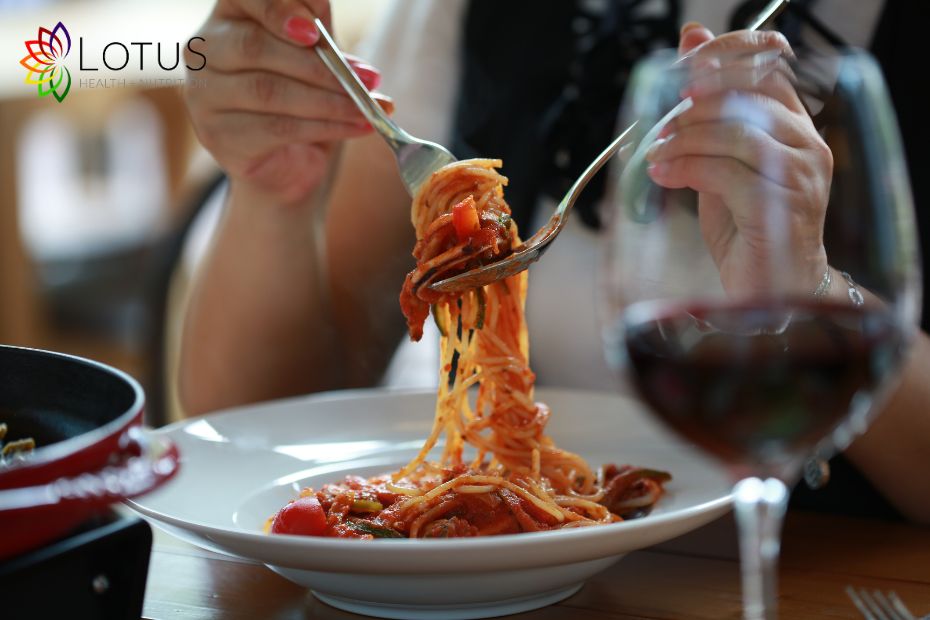Intuitive eating is a revolutionary approach to health and wellness that encourages you to listen to your body and make food choices that feel good both physically and mentally. Developed by dietitians Evelyn Tribole and Elyse Resch, intuitive eating promotes a positive relationship with food by focusing on internal cues rather than external diet rules. It is about rediscovering the pleasure of eating and trusting your body to guide you towards health.
Intuitive eating is about rediscovering the pleasure of eating and trusting your body to guide you towards health 
The 10 Principles of Intuitive Eating
The foundation of intuitive eating rests on ten core principles, each designed to help you reconnect with your body’s natural signals and cultivate a healthier, more fulfilling relationship with food.
- Reject the Diet Mentality: The first step in intuitive eating is to let go of the diet mentality. This means abandoning the idea that there is a perfect diet out there that will magically solve all your problems. Diets often lead to cycles of deprivation and overeating, which can harm both your physical and mental health. By rejecting diet culture, you make space for a more compassionate approach to food.
- Honour Your Hunger: Listening to your body’s hunger signals is crucial. Hunger is your body’s way of telling you it needs nourishment. Ignoring these signals can lead to intense cravings and overeating. By honouring your hunger, you maintain your energy levels and avoid the pitfalls of extreme hunger, which can make mindful eating difficult.
- Make Peace with Food: Give yourself unconditional permission to eat. When you tell yourself you can’t or shouldn’t have a particular food, it can lead to intense feelings of deprivation that build into uncontrollable cravings and often, bingeing. When you finally give in to your forbidden food, eating will be experienced with such intensity it usually results in overeating and overwhelming guilt.
- Challenge the Food Police: The food police are the unreasonable rules that dieting creates. These rules are deeply embedded in our minds and can cause guilt and shame. Challenging the food police involves recognizing and questioning these beliefs. By doing so, you free yourself from the judgment that can sabotage your relationship with food.
- Discover the Satisfaction Factor: Eating should be a pleasurable experience. Often, dieting can strip away the joy of eating, making it a chore rather than a delight. By seeking satisfaction in your meals, you’re more likely to feel content and less likely to overeat. This means choosing foods that you enjoy and eating them in a pleasant environment.
- Feel Your Fullness: Just as it’s important to honour your hunger, it’s equally important to respect your fullness. Listen for the signals that tell you that you are no longer hungry. Observe how different foods and portion sizes make you feel. This awareness helps you stop eating when you’re comfortably full, not stuffed.
- Cope with Your Emotions with Kindness: Food is often used as a way to cope with emotions, but emotional eating doesn’t solve the underlying problems. By developing strategies to deal with your emotions that don’t involve food, you can address the root causes of your feelings. This might include techniques like mindfulness, journaling, or seeking support from friends and family.
- Respect Your Body: Accept your genetic blueprint. Just as a person with a shoe size of eight would not expect to realistically squeeze into a size six, it is equally as futile (and uncomfortable) to have a similar expectation about body size. Respect your body so you can feel better about who you are. It’s hard to reject the diet mentality if you are unrealistic and overly critical about your body shape.
- Movement – Feel the Difference: Forget militant exercise. Just get active and feel the difference. Shift your focus to how it feels to move your body, rather than the calorie-burning effect of exercise. If you focus on how much you enjoy an activity, like walking, dancing, or yoga, you’re more likely to stay active and enjoy the benefits of movement.
- Honour Your Health – Gentle Nutrition: Make food choices that honour your health and taste buds while making you feel good. Remember that you don’t have to eat perfectly to be healthy. You will not suddenly get a nutrient deficiency or gain weight from one snack, one meal, or one day of eating. It’s what you eat consistently over time that matters. Balance, not perfection, is what counts.
Reproduced from the 10 Principles of Intuitive Eating by Evelyn Tribole and Elyse Resch

The benefits of Intuitive Eating
Embracing intuitive eating can lead to numerous physical and mental health benefits. Here are some of the key advantages:
Improved physical health
By listening to your body and feeding it according to its needs, you are more likely to achieve and maintain a healthy weight. Intuitive eating encourages a balanced diet that includes a variety of foods, which can improve your overall nutrition and energy levels.
Enhanced mental well-being
Intuitive eating helps reduce the stress and anxiety associated with dieting. By removing the strict rules and guilt often tied to food, you can enjoy eating again. This approach promotes a positive body image and self-esteem, as it encourages self-compassion and acceptance.
Better relationship with food
One of the most significant benefits of intuitive eating is the improvement in your relationship with food. Instead of viewing food as an enemy or a reward, you learn to see it as nourishment and pleasure. This can lead to more mindful eating habits and a greater appreciation for the food you consume.
Instead of viewing food as an enemy or a reward, you learn to see it as nourishment and pleasure 
Tips for getting started with Intuitive Eating
Transitioning to intuitive eating can be a significant shift, especially if you have been dieting for many years. Here are some tips to help you get started:
Be patient with yourself
Change doesn’t happen overnight. It’s important to be patient and compassionate with yourself as you learn to listen to your body’s signals. There will be ups and downs, but each step is progress.
Practice mindfulness
Mindfulness can help you tune into your body’s hunger and fullness signals. Try to eat without distractions, savour each bite, and pay attention to how different foods make you feel.
Keep a journal
Writing down your thoughts and feelings about food can help you identify patterns and triggers. A journal can also be a place to celebrate your successes and reflect on your journey.
Seek support
Talking to a non-diet nutritionist or joining a support group can provide valuable guidance and encouragement. Sharing your experiences with others can help you feel less alone and more motivated.

Common misconceptions about Intuitive Eating
Despite its many benefits, intuitive eating is often misunderstood. Here are some common misconceptions:
Intuitive Eating is just another diet
Intuitive eating is not a diet. It’s an anti-diet approach that rejects the notion of restricting food or following external rules. It’s about tuning into your body’s needs and trusting yourself to make choices that feel right.
Intuitive eating is not a diet. It’s an anti-diet approach that rejects the notion of restricting food or following external rules 
You can eat anything, anytime
While intuitive eating does give you permission to eat all foods, it’s not about eating mindlessly or indulging in every craving without thought. It’s about finding a balance and listening to what your body truly needs and wants.
It’s only for people who want to lose weight
Intuitive eating is for everyone, regardless of their weight or health goals. It’s about developing a healthier relationship with food and your body, which can benefit anyone.
Embrace a healthier, happier you!
Intuitive eating offers a path to reclaiming your health and happiness by fostering a positive, mindful approach to food. By following the 10 principles of intuitive eating, you can break free from the cycle of dieting and discover a more fulfilling way to nourish your body and soul. Remember, the journey to intuitive eating is unique for everyone, so be kind to yourself and take it one step at a time.

If you’re struggling with your relationship with food + body image issues and need help, please reach out and book an appointment by clicking the link below.
If we’ve helped you nurture your body + mind, tell others the good news by leaving us a review on Google!
Keep up-to-date with the latest news on our Facebook + Instagram pages.


